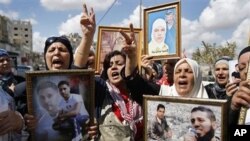Negotiations on a prisoner exchange between Israel and the Palestinian militant group Hamas have entered a crucial stage.
After marathon top-level meetings in Jerusalem, Israel is moving toward a lopsided prisoner swap with Hamas - 1,000 Palestinian detainees in exchange for captive soldier Gilad Shalit. The Israeli soldier was captured by Palestinian gunmen in a cross-border raid three and a half years ago and has been held in the Hamas-ruled Gaza Strip.
Israeli Defense Minister Ehud Barak said the government is making intensive efforts to reach an agreement.
Barak, a former general and army chief of staff, said it is a supreme duty to bring the captive soldier home, but he added, "not at any price."
The sticking point concerns about 20 hardcore Palestinian militants responsible for deadly attacks on Israelis. In its latest response to Hamas, Israel demanded that these prisoners be deported to Gaza or abroad instead of returning home to the West Bank. Israel believes the militants would be less of a terror threat in Gaza, which is blockaded, than in the West Bank which is close to Israeli cities.
But Hamas says the men must return to the West Bank, and Israel's demand could hold up a deal.
Hamas official Izzat Rashak warned that Gilad Shalit "will not see the light of day" until Israel meets the group's demands.
There are mixed feelings about the prisoner swap in Israel. Many Israelis sympathize with the plight of Shalit's family and its public campaign to win his release. Noam Shalit, the captive soldier's father, says Israel has carried out lopsided prisoner swaps in the past, so there is no reason for further delay.
"We are waiting for decisions, and we think it is about time to decide and conclude this issue," Shalit said.
But many other Israelis say the deal is a grave mistake. They warn that it will strengthen Hamas, while weakening Palestinian moderates; and it will lead to a surge in violence and more terrorist blackmail.
News
Israel and Hamas Move Toward Prisoner Swap
update




